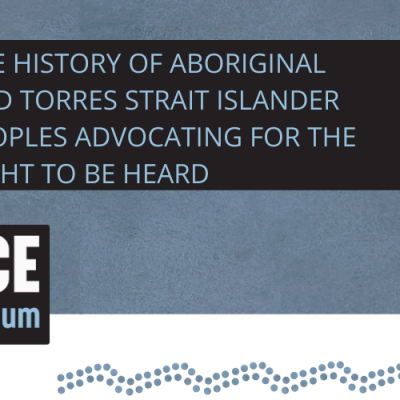Refine results
-
14 December 2012Book page
Annual Report 2002-2003: Chapter 1
The Commission is a national independent statutory body established under the Human Rights and Equal Opportunity Commission Act 1986. It has a President and five Commissioners. The five positions are currently held by three persons. Please refer to the organisational chart for further information. -
Legal14 December 2012Webpage
Inquiry into national homelessness legislation (2009)
Inquiry into national homelessness legislation Australian Human Rights Commission Submission to the House of Representatives Standing Committee on Family, Community, Housing and Youth 1 September 2009 Download Word [554 kb] Download PDF [376 kb] Table of Contents 1 Introduction 2 Summary 3 Recommendations 4 What is the relevance of human rights to reducing homelessness? 5 What is a ‘human… -
Aboriginal and Torres Strait Islander Social Justice2 August 2023Webpage

The history of Aboriginal and Torres Strait Islander peoples advocating for the right to be heard
There is a long history of First Nations people advocating for the right to representation and participation in decisions that affect them. The events listed are a selection of moments in history when Aboriginal and Torres Strait Islander peoples have taken action to call for large-scale change by Australian governments to realise their Indigenous rights, demonstrating the history leading to the… -
14 December 2012Book page
Annual Report 2008-2009: Chapter 2
One of the Commission’s central functions is to undertake education programs that increase public awareness and generate discussion of human rights and anti-discrimination issues within Australia. -
Legal14 December 2012Webpage
Northern Territory Emergency Response Review Board
Submission of the HUMAN RIGHTS AND EQUAL OPPORTUNITY COMMISSION (HREOC) to the NORTHERN TERRITORY EMERGENCY RESPONSE REVIEW BOARD on the REVIEW OF THE NORTHERN TERRITORY EMERGENCY RESPONSE 15 August 2008 Human Rights and Equal Opportunity Commission Level 8, 133 Castlereagh St GPO Box 5218 Sydney NSW 2001 Ph. (02) 9284 9600 Contents Introduction Summary Recommendations Ten point plan to… -
14 December 2012Book page
Annual Report 2001-2002: Chapter 6
Dr Ozdowski has made public education on human rights a priority for his term. Other priority areas are the elderly in our ageing society and children. Dr Ozdowski is working to progress the Commission’s 2000 recommendations for alleviating age discrimination, as set out in the report Age matters: a report on age discrimination. -
Legal14 December 2012Webpage
Submission: National Security
Submission of the Human Rights And Equal Opportunity Commission to the Senate Legal And Constitutional Committee Inquiry into the Provisions of the National Security Information (Criminal Proceedings) Bill 2004 and the National Security Information (Criminal Proceedings) (Consequential Amendments) Bill 2004 Introduction 1. The Human Rights and Equal Opportunity Commission (the Commission) is…
